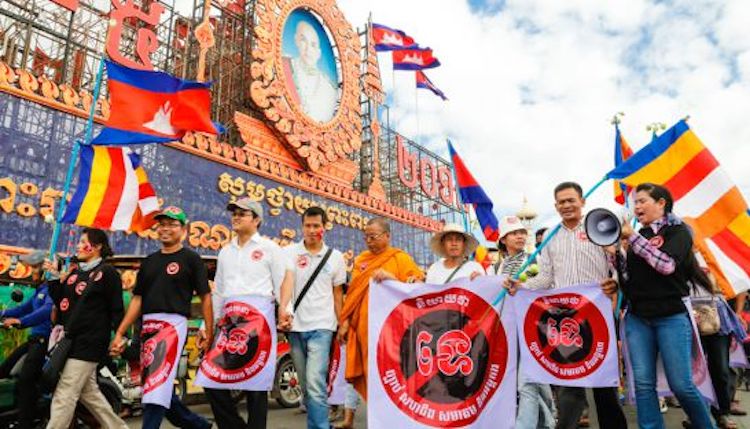NGOs parse LANGO warning

NGOs huddled yesterday to make sense of a letter from the Interior Ministry asking them to comply with controversial provisions of the Law on Associations and NGOs (LANGO), with some considering requesting further clarification or an extension of a September deadline for compliance.
The meeting was organised by the Cooperation Committee for Cambodia (CCC) following the issuance of an Interior Ministry letter calling on NGOs to comply with the law, specifically to submit bank account details, and financial and activity reports, prompting unease and scepticism among prominent civil society leaders.
Sar Mory, the deputy president of the Cambodian Youth Network, said the meeting at CCC centred on the various challenges faced in meeting the Interior Ministry’s requests, with some groups, especially those dealing with human rights violations, uncomfortable and reluctant to comply with the directive.
“Their work is sensitive. They don’t feel comfortable submitting the report because then it is easy for the government to target these NGOs working in human rights,” Mory said. “So they want to propose a delay to submit the reports as much as we can and to develop a common format for the reporting.”
Concerns were raised with the ministry’s demands, he said, such as the September deadline for compliance and the inability of smaller NGOs and associations to invest the human resources to meet the requirements. The groups were hoping to arrange a meeting with the ministry to air these grievances, he added, including potentially amending the now two-year-old law to ease the restrictive articles.
The LANGO letter coincided with other letters sent on Tuesday night to election monitors Comfrel and Nicfec, members of the NGO coalition called the “Situation Room”, after the room in which they met. The letters scolded the groups for alleged political bias during their monitoring of the June 4 commune elections, a move some called an effort to silence NGOs ahead of next year’s national election.
“So this is the new picture of intimidation and shrinking space for civil society organisations in Cambodia,” Mory said.
Adhoc spokesman Sam Chankea said even for the larger NGOs it would be difficult to finish annual reports in two months given the complex nature of their projects and donor involvement.
“This is pressure. For Adhoc, if the requirement is to complete in two months, then we cannot complete it,” Chankea said. He added that he believed the requirement was only due to calls by Prime Minister Hun Sen to investigate the Situation Room, a pretext he said was now being used to restrict other NGOs.
Licadho Deputy Director of Advocacy Naly Pilorge said that the rights group supported the concerns and demands raised by the other NGOs, but said that ultimately they were all being asked to comply with a law that she said was unconstitutional and in violation of multiple treaties and conventions signed by Cambodia.
“Comply to what and at what cost?” she asked. “Are the LANGO requirements intended to ensure all civil society groups become government organisations and for them to be controlled and silenced until [the] next elections?”

